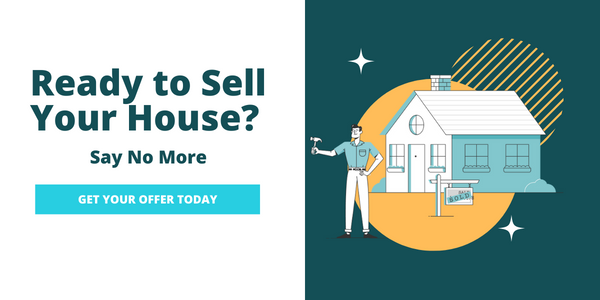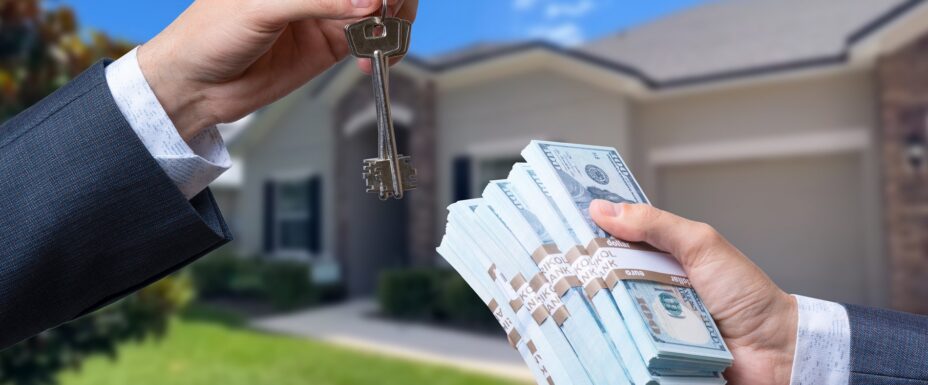Can You Sell A House With A Mortgage?
Reviewed by: Brandon Brown
In a perfect world, you’d buy your first house, and it would suit your needs for the rest of your life. The reality, however, might steer that dream in a different (and even more exciting) direction. When inevitable life changes come knocking, selling your home might be necessary.
But can you sell a house with a mortgage if you haven’t paid it off? In short, yes.
Though it may add a few more steps to your selling process, selling a house with an outstanding mortgage balance is doable. It starts with considering how much you owe on your mortgage and understanding the equity you’ve acquired while owning the home. Let’s take a closer look at how these elements come together to help you sell your home with a mortgage intact.
Selling a House With a Mortgage: What You Need To Know
Selling a house with a mortgage isn’t uncommon. The most popular types of mortgage loans come with repayment periods stretched over 30 years, but most homeowners spend less than half that time in a home before selling.1 In many of those cases, homeowners still have a significant amount left to pay on their loans when they decide to move.
So, what happens when you sell a house with a mortgage?
In an ideal situation, if you’re selling your home while you still have a current mortgage, that means you’re in a position where you’ve built up enough equity to use the proceeds from the sale to turn a profit even after using the funds.
You can then use these funds to:
-
Pay off the remaining loan balance
-
Pay fees like closing costs and commissions
-
Pay prepayment penalties, if applicable
Step 1: Determine Your Mortgage Balance
The first thing you should do as a homeowner before putting your house on the market is to find out your mortgage repayment balance. This is a crucial step toward accurately estimating the profit you stand to make before working through how to sell a house with a mortgage.
Determining your payoff amount isn’t as simple as checking your monthly mortgage statement—that document only reflects the most current information on your loan. Instead, you’ll need to contact your lender.
When you contact your lender to get your payoff amount, they’ll provide you with a quote based on an anticipated closing date, which generally expires within 10 and 30 days, depending on the lender.
The quote will include:
-
The remaining balance on the mortgage
-
The amount of accrued interest as of the closing date
If it’s been less than five years since you opened the mortgage account, you may have to pay what are known as prepayment fees.2This is a fee that some lenders charge when mortgage holders pay off their loans far earlier than the term stipulates. However, not all lenders charge prepayment fees.
Step 2: Understand Your Home Equity
Equity refers to the profit you can turn after selling your home. It reflects the real financial value of the property to you, minus mortgage balances, transaction fees, and closing costs.3
As a homeowner, you build two types of equity.4 The first is called home investment equity. In most cases, you begin accruing this equity right away when you make the down payment on your home loan. The down payment goes directly toward the loan balance, so the greater your down payment, the larger your financial stake in the property at the outset.
But other factors can also affect the amount of equity you hold, such as:
-
Your mortgage balance – In many ways, determining your equity requires a simple calculation: the value of your home minus the balance on your home loan. The more you’ve paid off, the greater your equitable stake.
-
Your home improvements – Making changes and upgrades to the property that increases its market value can drive up the amount of equity you hold.
The second type of equity that homeowners hold is known as earned equity. It’s difficult to estimate what an individual’s earned equity will be because you haven’t earned it until you’ve sold the home.
Earned equity is influenced by two factors:
-
Local real estate market conditions
-
Return on investment (ROI) earned through repairs and renovations
Simply put, when you sell your house, the equity is your profit minus any remaining mortgage balance and closing costs.
What If You Owe More Than You’ve Earned in Equity?
In real estate lingo, not having earned enough equity to pay off your mortgage, cover closing costs, and still earn a profit is known as having negative equity, or being “underwater.” It’s not the most financially favorable situation to be in, and can lead some homeowners not to sell.
If you find yourself in this position, you still have three alternative options.4
#1 Pay the Difference Out-of-Pocket
Your first option is to make up for the disparity yourself, usually by paying closing costs like taxes, agent commissions, and escrow fees out of your own pocket. If you have savings to spare, balancing the difference can help you spring for a new home despite still owing money on your mortgage.
#2 Wait For Better Market Conditions
The value of your home will fluctuate over the life of your mortgage. As we mentioned earlier, renovations and upgrades can increase the value, as can paying down your mortgage balance. But there’s a third factor that comes into play here: market conditions. If you’re selling your home when home prices are low, you may find that you owe more than the home is worth.
In this position, many homeowners may choose not to sell until market conditions improve and property value increases. If you have the luxury of waiting a few months to sell your home, doing so may tip the scale in your favor.
#3 Short-Sell Your Home
If you aren’t in the financial position to pay fees out of pocket, or you can’t wait any longer to sell, you can resort to what’s known as a short sale, or selling your home for less than what you owe on your mortgage.
You’ll need to get special permission from your mortgage lender to sell your home for less than the mortgage amount. Lender approval is required because short selling means the institution loses money as well.
Short selling can be a solution in extreme situations, but you should be aware of the ramifications of doing so. Short selling comes with two drawbacks:
-
You forfeit profit you could have used for a future down payment
-
Your credit score is negatively impacted
Buying Another House Without Equity
One of the key advantages to building equity on a home and turning that equity into profit when you sell it is using that profit to pay for your new home. That’s why many buyers sell their current home before buying a new one—so that they can pay for their new home with the money they’ve just earned.
That said, there are times when homeowners buy a new home while their old one is still on the market. If that’s your situation, there are a few options you can consider to ease your financial burden until you can get your hands on your equity.
Here are a few strategies you can consider:4
-
Offer a contingency sale – A contingency sale refers to an offer on a property that includes a condition that the sale can’t close until you’ve sold your current home and the equity is available. However, depending on market conditions, other sellers may not agree to this arrangement if they’re trying to move quickly on selling.
-
Obtain a bridge loan – Some homeowners take out a temporary loan for the amount of the down payment on a new home until their current home sells. However, this can mean making three payments a month until you sell your old home: one toward your old mortgage, one toward your new mortgage, and one toward the bridge loan.
-
Open a home equity line of credit – A home equity line of credit, or HELOC, is essentially a short-term loan that allows you to borrow against your equity. You can use it to finance a down payment on a new mortgage and pay it off when the equity is available.
Ease the Financial Stress of Homebuying with FlipSplit
It is certainly possible, and more common than most people realize, to sell a house while you still have a mortgage. It’s even possible to sell your house if you owe more on your mortgage than you’ve gained in equity.
Another option? Instead of putting yourself in a financial blunder between debt and equity, skip right to earning money in your pocket with FlipSplit. As you may have heard through the grapevine, we buy houses in California.
FlipSplit creates a solution that offers a way to sell your home quickly at a competitive price so you can free up the funds to pay off your mortgage and make a down payment on a new home. FlipSplit cuts middle parties out of the picture to deliver a fast, seamless way for homeowners to sell their home, make a profit, and move into new beginnings.
FlipSplit is also here to help you with any questions you may have about the home-selling process, so if you’re curious about the differences between a cash offer vs. a mortgage for the seller, ways to avoid foreclosure on your house, all of the different home-selling options, and much more, FlipSplit is here for you.
When you sell to FlipSplit, we pay you in cash for your home. Then, we fix it up, increase its value, and flip it. And when we do, we split the proceeds with you 50/50.
Ready to sell? Find out how it works today and request an offer.
Sources:
- Zillow. Sellers: Results from the Zillow Consumer Housing Trends Report 2021. https://www.zillow.com/research/sellers-consumer-housing-trends-report-2021-30175/
- Consumer Finance. What is a prepayment penalty? https://www.consumerfinance.gov/ask-cfpb/what-is-a-prepayment-penalty-en-1957/#
- Investopedia. Home Equity: What It Is, How It Works, and How You Can Use It. https://www.investopedia.com/terms/h/home_equity.asp
- Zillow. What Happens When You Sell a House With a Mortgage? https://www.zillow.com/sellers-guide/what-happens-when-you-sell-a-house-with-a-mortgage/

Reviewed by: Brandon Brown
As a long-time Asset Manager, Investor, Real Estate Agent, and Broker/Owner of BayBrook Realty in Orange County, Brandon Brown is one of FlipSplit’s lead Real Estate experts. Having worked on over 2,000+ real estate transactions, Brandon brings a depth of knowledge that ensures clients are appropriately treated with honesty and integrity. His insights and advice have been published in numerous blogs beyond FlipSplit, and he keeps a close eye on market trends and statistics, which are updated weekly on his social media pages. Outside work, you can find him participating and serving at church, cycling, mountain biking, surfing around Orange County and beyond, and enjoying time with his wife and two daughters.










